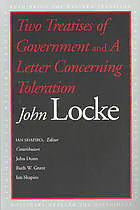
Two treatises of government : and a letter concerning toleration PDF
Preview Two treatises of government : and a letter concerning toleration
Rethinking the Western Tradition The volumes in this series seek to address the present debate over the Western tradition by reprinting key works of that tradition along with essays that evaluate each text from di√erent perspectives. EDITORIAL COMMITTEE FOR Rethinking the Western Tradition David Bromwich Yale University Gerald Graff University of Illinois at Chicago Geoffrey Hartman Yale University Samuel Lipman (deceased) The New Criterion Gary Saul Morson Northwestern University Jaroslav Pelikan Yale University Marjorie Perloff Stanford University Richard Rorty Stanford University Alan Ryan New College, Oxford Ian Shapiro Yale University Frank M. Turner Yale University Allen W. Wood Stanford University Two Treatises of Government and A Letter Concerning Toleration J O H N L O C K E Edited and with an Introduction by Ian Shapiro with essays by John Dunn Ruth W. Grant Ian Shapiro Yale University Press New Haven and London Published with assistance from the Annie Burr Lewis Fund. Copyright ∫ 2003 by Yale University. All rights reserved. This book may not be reproduced, in whole or in part, including illustrations, in any form (beyond that copying permitted by Sections 107 and 108 of the U.S. Copyright Law and except by reviewers for the public press), without written permission from the publishers. Set in Times Roman type by Keystone Typesetting, Inc. Printed in the United States of America by Vail-Ballou Press, Binghamton, New York. ISBNs: 0-300-10017-5 (cl.) 0-300-10018-3 (pbk.) A catalogue record for this book is available from the Library of Congress and the British Library. The paper in this book meets the guidelines for permanence and durability of the Committee on Production Guidelines for Book Longevity of the Council on Library Resources. 10 9 8 7 6 5 4 3 2 1 Contributors John Dunn is Fellow of King’s College and Professor of Political Theory at the University of Cambridge. Ruth W. Grant is Professor of Political Science at Duke University. Ian Shapiro is William R. Kenan, Jr., Professor and Chair of the Department of Political Science at Yale University. Contents Introduction: Reading Locke Today ix Ian Shapiro Note on the Texts xvi Texts Two Treatises of Government 1 The First Treatise: The False Principles and Foundation of Sir Robert Filmer 7 The Second Treatise: An Essay Concerning the True Original, Extent, and End of Civil Government 100 A Letter Concerning Toleration 211 Essays Measuring Locke’s Shadow 257 John Dunn John Locke on Women and the Family 286 Ruth W. Grant John Locke’s Democratic Theory 309 Ian Shapiro Index 341 Introduction: Reading Locke Today IAN SHAPIRO Old books are read for many reasons. Intrinsic enjoyment is one. Coming to grips with the past is another. Understanding the origins of the world we live in is a third. Additional purposes become relevant when old books are part of a received canon. Canonized texts may be heralded as repositories of important truths. They might codify ideologies, whether dominant or sub- versive. They might be objects of controversy as to their true meaning. When canonized texts are works of political theory, it is usually because they are thought to illuminate enduring fundamentals of political associa- tion. Sometimes they gain additional notoriety when they move people, individually or collectively, to political action. John Locke’s mature writings about politics, collected here, are worth reading for all these reasons at least. They have stood the test of time as captivating works, in print more or less continuously for well over three centuries and translated into all of the world’s major languages. They are remarkable historical documents addressed to the turbulent political con- flicts of Locke’s day, yet at the same time they transcend that and many another particular context to which they have been deemed relevant. In them Locke develops arguments about freedom of conscience and belief, the relations between religion and politics, the nature of property, the fam- ily, consent, majority rule, resistance, and the foundations of political legit- imacy that have become perennials of political argument in the modern West. Locke’s views on all these subjects are taken up in the interpretive essays that follow the texts in this volume. Here I will limit myself to some general remarks about his life and political writings. As is frequently true with canonized texts—indeed this often facilitates canonization—Locke’s central arguments are sufficiently complex that they invite disputations about their true meaning. Similar controversy at- tends the question whether Locke’s political writings stand independently of, are derived from, or live in tension with, his voluminous writings on philosophy and theology, and the degree to which his views evolved over the course of his lifetime. He was born in 1632 and died in 1704, so that his
